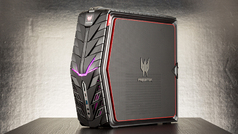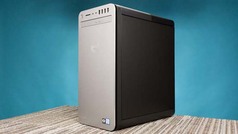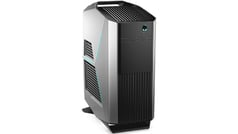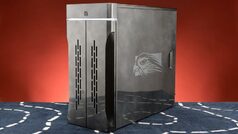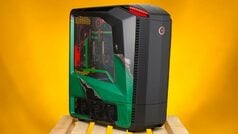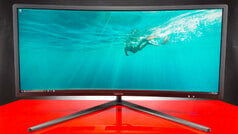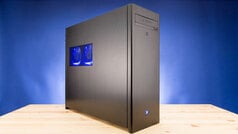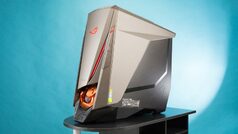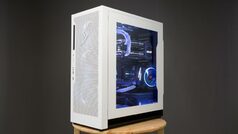
[ad_1]
With a look that’s more gaming console than gaming desktop, the MSI Trident (starts at $899.99; $1,099.99 as tested) is very intriguing. Its small footprint, sleek design, and fast hardware seem like they’d add up to a pricey prospect, but it’s actually quite affordable. With an Nvidia GTX 1060 graphics card and an Intel Core i7 processor, the Trident is one of the smallest VR-ready desktops in town. You pay for it in upgradability given some of the custom work involved in its build, but you’re getting a powerful and good-looking box that will play games smoothly at top settings for years to come. If you have room in your budget, the Acer Predator G1-710-70001 ( at Amazon)(Opens in a new window) is a better performer, while the more similarly priced Dell XPS Tower Special Edition ($999.99 at Dell)(Opens in a new window) is a traditional-style option.
Design and Features
The Trident ( at Amazon)(Opens in a new window) is undeniably a head-turner. It can only stand upright with the pack-in stand, and has rubber feet should you prefer to orient it horizontally. It weighs just over 7 pounds, and when in the stand it measures 13.9 by 3.8 by 9.89 inches (HWD)—smaller than an Xbox One ($200.00 at eBay)(Opens in a new window) . The caveat to having a full system with such a small body is that it requires a laptop-like power brick instead of an internal power supply. Still, that can be tucked away behind a desk pretty easily, while a big tower will always be a big tower.
In addition to the small footprint, the Trident also looks slick. It’s all gray and black plastic, but as with the PlayStation 4 ($799.95 at Amazon)(Opens in a new window) , the angular design with slanted sides adds panache (though its tilted bottom is why the stand is necessary). A triangular RGB light on the top-right corner provides some more flair, and you customize its color through MSI’s software. One of my favorite aspects is the vented cutout that lets you see the graphics card’s fan in action. It’s a neat touch that makes it come off like a more premium product.
Similar Products
One downside of console-like styling is that upgradability suffers. The Mini-ITX graphics card is not quite stock, having been custom-designed for the small body, so swapping it out for another, more powerful card in the future is a murky prospect at best. MSI’s Silent Storm Cooling 2 system is specially built, too, with blades that increase airflow but decrease sound. It works like a charm, as the Trident keeps cool and runs quietly. The limited upgrade potential doesn’t make this system any less powerful right now, but it does make the purchase much more like buying a laptop. You will most likely have to change out the whole system eventually rather than replace parts over time, which limits the Trident’s life span compared with that of a normal desktop.
The selection of ports is a good fit for a desktop intended for VR, since headsets require multiple ports simultaneously. The front hosts a headphone jack, a microphone jack, a USB-C port, two USB 3.1 Type-A ports (one with Super Charger 2), and a VR-Link port. The last, a sneaky MSI special, is in reality an HDMI connection that runs from the graphics card’s HDMI-out through the chassis to the front. This gives you front HDMI access for headsets, so you don’t have to turn the desktop or fumble around back for the port. It’s a small change, but one that saves time and frustration in real-world use. To complete the set of ports, on the rear there’s an HDMI port, four USB 2.0 ports, one USB 3.1 Type-A port, another mic jack, audio line-in and line-out jacks, another VR-Link (should you prefer to plug your headset in around back anyway), an Ethernet port, and the DC jack. The graphics card also has HDMI, DisplayPort, VGA output ports.
There are several configurations available, but our review unit includes an M.2 128GB solid-state boot drive and a 1TB hard drive, which is more than adequate and a good deal at this price. The Trident also supports Bluetooth 4.2 and dual-band 802.11ac wireless, and is protected by a one-year parts warranty.
Performance
Our unit is equipped with a 3.4GHz Intel Core i7-6700 processor, 8GB of memory, and a 3GB Nvidia GeForce GTX 1060, hardware that helps the Trident deliver. Though not the main focus of a gaming product, everyday tasks were no problem. It scored right in line with even some expensive small desktops like the Zotac Zbox Magnus EN980 on the PCMark 8 Work Conventional productivity test. This remained true on the multimedia tests, where the Trident outperformed the Zbox Magnus and even the Acer Predator G1.

Of course, gaming is what will make or break the Trident, and it succeeds despite its compact form. It scored 27,653 points on 3DMark Cloud Gate and 5,457 points on 3DMark Fire Strike Extreme, which are very solid results, especially at this price. The Zbox Magnus was behind at 18,034 on Cloud Gate and 5,611 on Fire Strike Extreme, despite its higher price tag. The XPS Tower Special Edition exceeded it on Fire Strike Extreme (7,100). Sitting at the top of this price range at $2,299.99, the Predator G1 scored 30,584 and 9,263 on these tests.
The Heaven and Valley gaming tests further affirmed the Trident’s capabilities. It pulled off a fine average of 71 frames per second (fps) and 79fps, respectively, on these tests set to Ultra graphics quality and 1080p resolution—a testament to Nvidia’s new generation of graphics, given that this is not one of the higher cards in the hierarchy. You won’t get reliable 4K in cutting-edge games, but modern games in full HD should be no trouble. This includes VR, which isn’t surprising as Nvidia has always given the GTX 1060 as the baseline for a smooth experience.
Conclusion
Though the MSI Trident shares the general shape and size of a gaming console, it offers a lot more than an Xbox or PlayStation for the extra cost as a full Windows 10 gaming system. With a very solid GTX 1060 graphics card and a fast Core i7 processor, the Trident is a nice deal at $1,099, and can be further configured to suit more specific needs you may have. It lives up to MSI’s claim as the smallest VR-ready desktop around, offers plenty of ports, and runs quietly despite its size and components. You almost certainly can’t upgrade, though, at least not easily, so like a console, you’ll be stuck with the same box for a long time—but at least it’s a strong one. The Dell XPS Tower Special Edition is a more standard alternative with a GTX 1070, and thus better gaming performance at higher resolutions, and, if you have the budget, the only slightly larger Acer Predator G1-710-70001 is a much faster option.
3.5

(Opens in a new window)
(Opens in a new window)
View More
The MSI Trident is an attractively priced gaming desktop, but its uniquely compact design restricts your upgrade options.
[ad_2]
Source link : https://www.pcmag.com/reviews/msi-trident
